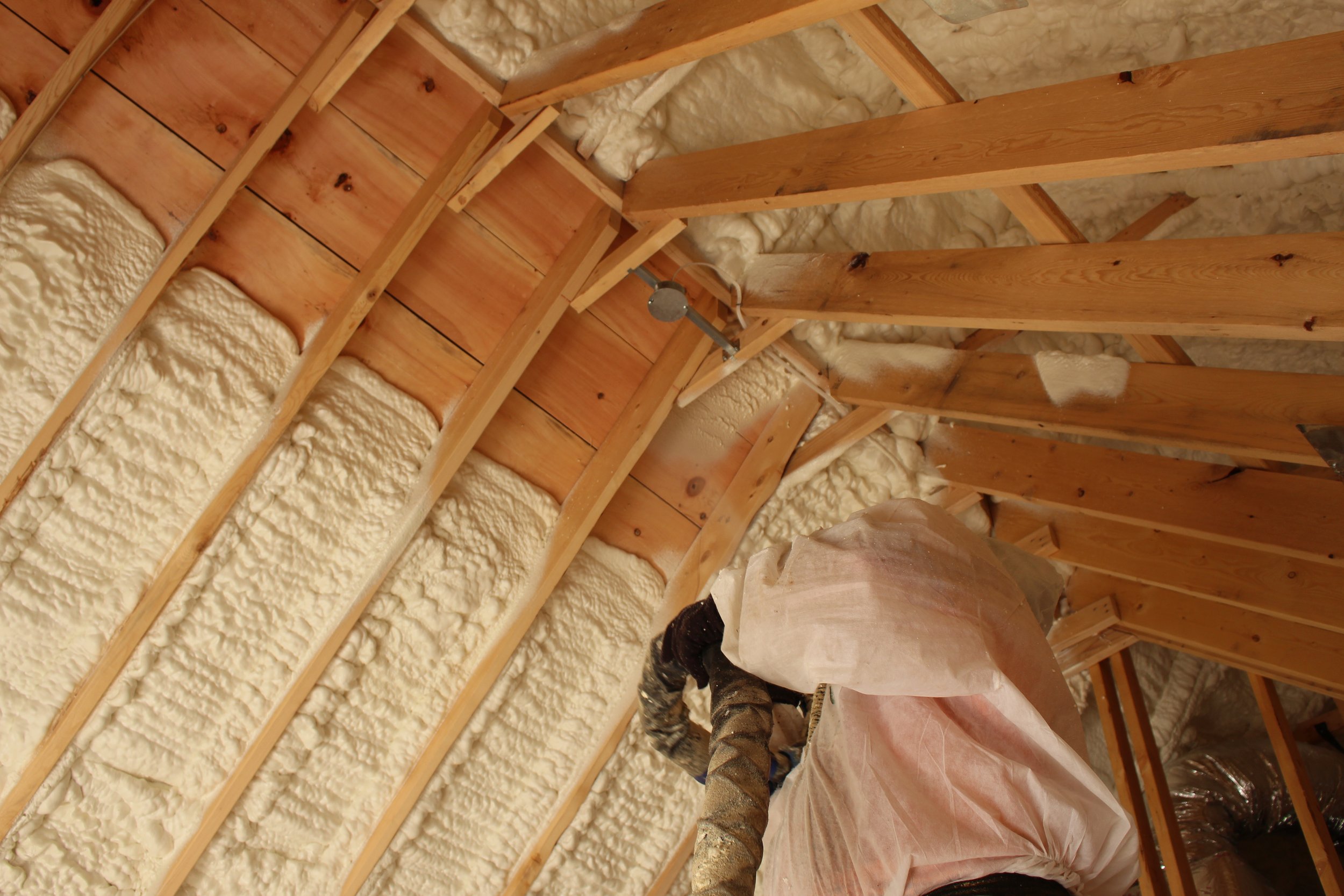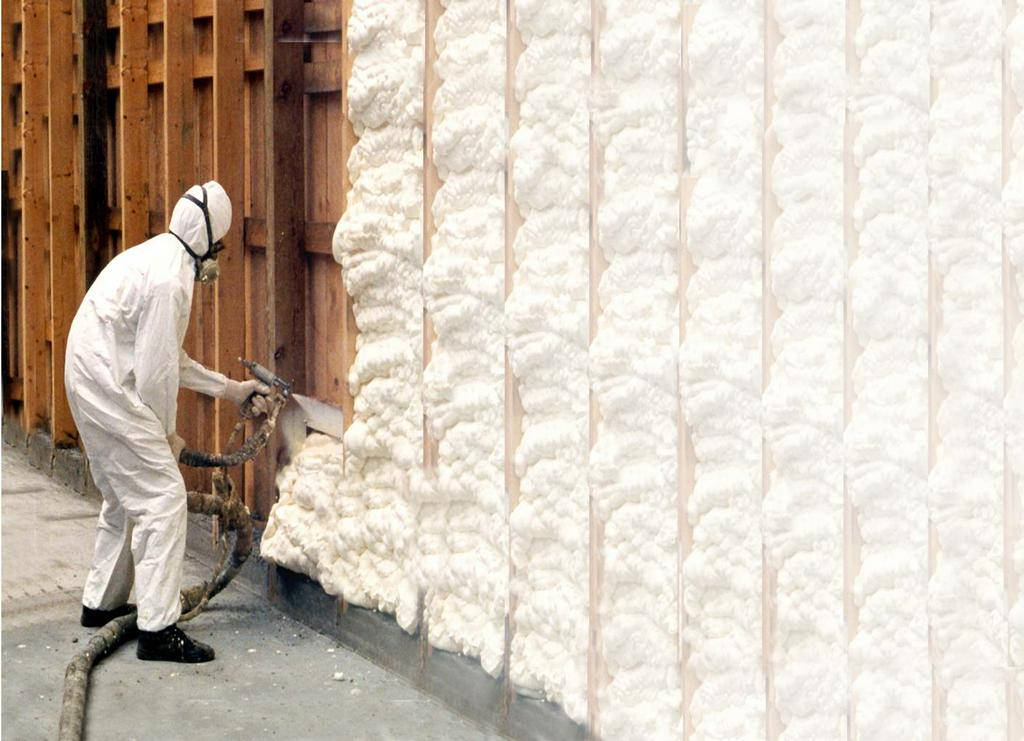Choosing the Right Sort Of Spray Foam for Your Insulation Demands
Choosing the Right Sort Of Spray Foam for Your Insulation Demands
Blog Article
Exactly How Spray Foam Can Enhance Power Effectiveness in Any Type Of Structure
Spray foam insulation has actually arised as a crucial service for improving energy efficiency across different structure types. As residential or commercial property proprietors increasingly look for sustainable remedies, the implications of spray foam insulation expand beyond mere utility cost savings.
Recognizing Spray Foam Insulation
Spray foam insulation is significantly identified for its superior thermal efficiency and convenience in different applications. Composed mainly of polyurethane, this insulation product is used as a liquid that increases upon call, filling spaces and developing a seamless barrier. This distinct home enables spray foam to adapt uneven surfaces, making it an excellent option for both commercial and residential structures.

Application of spray foam insulation is typically carried out by experienced experts making use of specific devices, ensuring ideal efficiency and security - Spray Foam. The curing process is rapid, enabling quick installation and minimal disruption. Because of this, spray foam insulation is significantly being utilized in new building and retrofitting projects due to its ability to boost architectural stability while improving overall power effectiveness in structures
Benefits of Energy Performance
Power performance plays a critical function in minimizing functional costs and lessening environmental impact across various fields. By maximizing power usage, homeowners and companies can attain significant cost savings on utility bills, which directly enhances economic performance. Efficient power usage means less reliance on fossil gas, thus contributing to a decrease in greenhouse gas emissions and advertising a more lasting setting.
Moreover, energy-efficient structures usually experience increased building values. As energy costs rise and sustainability comes to be a concern for consumers, properties with boosted energy efficiency features are extra eye-catching on the market. This trend motivates financial investment in energy-saving innovations, which can additionally drive technology and economic growth.
Along with ecological and financial advantages, energy performance can additionally improve the overall comfort and wellness of indoor areas. Correct insulation and effective cooling and heating systems help preserve consistent temperature levels, decreasing drafts and moisture levels, which consequently can bring about better indoor air high quality.
Inevitably, the benefits of energy efficiency expand beyond immediate financial savings, fostering a resistant economic climate, advertising environmental stewardship, and boosting the high quality of life for owners in any type of structure.
Exactly How Spray Foam Works
Normally applied as a fluid, spray foam broadens quickly upon call with surfaces, developing a strong obstacle that properly secures fractures and gaps. This unique residential or commercial property is because of its chemical make-up, primarily including polyols and isocyanates, which react when mixed to produce a foam that fills up gaps and sticks to various products, including metal, concrete, and wood.
When applied, the foam increases to numerous times its original quantity, making certain a limited seal that avoids air leakage. This process substantially lowers thermal connecting, which happens when heat transfers with products, causing energy loss. The foam's high R-value, an action of thermal resistance, adds to boosted insulation by lessening warm transfer in between the exterior and interior atmospheres.
Additionally, spray foam is immune to dampness and bugs, additionally improving its efficacy in keeping power performance. great post to read Its application can be customized to different areas, consisting of attic rooms, walls, and crawl areas, optimizing insulation across a structure. Spray Foam. In general, look at more info the innovative design and application method of spray foam make it an efficient option for boosting energy efficiency in any kind of structure, causing decreased power prices and a much more lasting built setting

Applications in Numerous Buildings
Various applications of spray foam insulation can be found across numerous building types, enhancing power efficiency and convenience. In residential homes, spray foam is commonly utilized in wall surfaces and attics to produce a smooth obstacle against air leaks, substantially reducing heating and cooling needs. This application is specifically advantageous in older homes, where typical insulation might be inadequate.
In industrial structures, spray foam insulation is used to roof covering systems and exterior walls, which assists to enhance thermal efficiency and shield versus moisture intrusion. Its lightweight nature makes it a suitable selection for retrofitting existing frameworks without including significant weight. Furthermore, spray foam can be made use of in commercial setups to shield pipelines and tank, keeping temperature level control for delicate products.
Institutional structures, such as colleges and health centers, gain from spray foam insulation by ensuring a consistent interior environment that sustains passenger comfort and health and wellness. The flexibility of spray foam allows it to adapt to numerous structure forms and sizes, making it a preferred choice for engineers and building contractors looking for efficient insulation options. In general, spray foam insulation works as a crucial part in attaining energy-efficient buildings across all fields.
Long-Term Expense Savings
Spray foam insulation offers substantial long-lasting cost financial savings for building proprietors and passengers by decreasing energy intake and reducing energy expenses. By providing a premium air seal, spray foam lessens the infiltration of outdoors air, thereby boosting the thermal performance of a structure. This results in extra effective home heating and cooling procedures, which can lead to significant reductions in power costs gradually.
In addition to instant financial savings on utility costs, the sturdiness and long life of spray foam insulation contribute to its economic advantages. Unlike standard insulation products, which might droop, settle, or degrade, spray foam maintains its efficiency for years, reducing the requirement for constant substitutes or repair work. This long life converts to lower upkeep prices and much less disturbance for owners.
In addition, structures outfitted with spray foam insulation commonly appreciate an increase in building worth, making them extra appealing to potential buyers or occupants. As power performance comes to be significantly prioritized, homes with efficient insulation options attract attention in the market. Ultimately, the integration of spray see page foam insulation not only enhances convenience yet additionally stands for a critical financial investment that generates considerable monetary benefits over the long term.
Verdict
In verdict, spray foam insulation works as a crucial element in improving energy performance throughout diverse building kinds. Its capacity to produce a seamless barrier versus air leak, combined with high R-values and moisture-resistant residential properties, substantially minimizes energy consumption and linked expenses. The implementation of spray foam not only adds to constant indoor temperature levels however also raises residential or commercial property worth, emphasizing its function as a prudent investment for both business and household buildings.
Spray foam insulation has emerged as a crucial option for boosting energy performance across different building types. Spray Foam. As an outcome, spray foam insulation is progressively being used in new building and construction and retrofitting jobs due to its capacity to enhance architectural stability while enhancing overall energy efficiency in structures
In general, the innovative design and application approach of spray foam make it an effective option for boosting power efficiency in any type of framework, leading to reduced energy expenses and an extra lasting built atmosphere.
Many applications of spray foam insulation can be located throughout various building types, improving power performance and convenience.In conclusion, spray foam insulation serves as an important element in improving power effectiveness throughout varied structure kinds.
Report this page